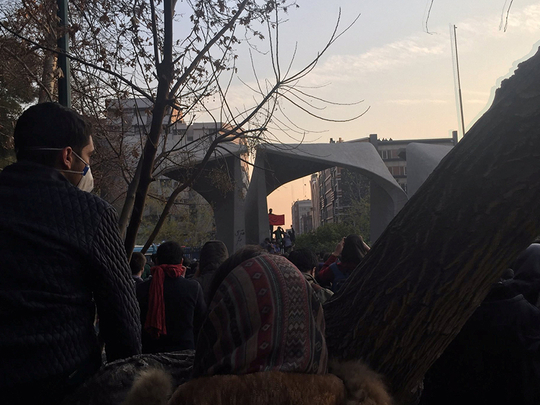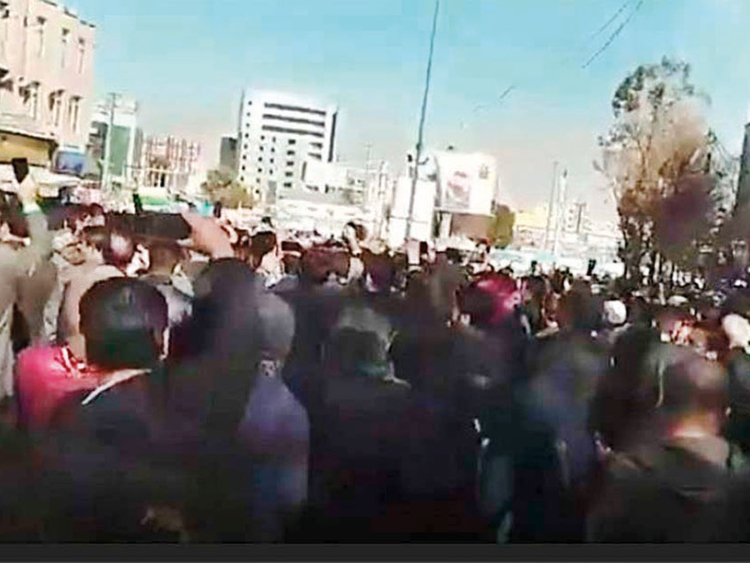
Iranian authorities warned against further “illegal gatherings”, as protesters rallied for a third day of demonstrations driven by anger over economic problems. A protest also erupted at the University of Tehran and tear gas filled the streets of downtown Tehran.
Street protests hit Iran for a third day running on Saturday, spreading to the capital Tehran with crowds confronting police and attacking some state buildings, and a social media report said two demonstrators had been shot dead in a provincial town.
There was chaos around the University of Tehran as several hundred people scuffled with police and shouted slogans against the regime for several hours, bringing traffic to a standstill.
Interior Minister Abdul Rahman Rahmani Fazli warned against any further anti-government action, saying: “We urge all those who receive these calls to protest not to participate in these illegal gatherings as they will create problems for themselves and other citizens.”
Videos on social media had shown students around Tehran’s university chanting slogans against the regime — mirroring protests that began in second city Mashhad before spreading to several major towns. But hundreds of conservative students later seized control of the entrance to the university, chanting “Death to the seditionists”.
Protests spread to several Iranian cities late on Friday, local media reported, in a rare display of public anger against the government of President Hassan Rouhani and its handling of the economy.
More than 50 people were arrested in Iran’s holy city of Mashhad, the semi-official Tasnim news agency reported on Friday, following national antigovernment protests that started over the economy and rising food prices but appeared to be broadening to include frustration with the political system. Other protests took place in Kermanshah, Rasht, Sari, Qazvin, Hamadan and the holy city of Qom, Fars news agency said.
Videos purporting to be of the protests in Mashhad, Iran’s second-largest city, circulated widely on social media platforms including Twitter and Telegram, showed protesters chanting against Rouhani and calling for “the economically corrupt” to be executed. A small number of people were also detained in Tehran, the capital, a senior provincial official told the Iran Labour News Agency.
Government officials have described the protests as a plot against the Islamic Revolution and the state.
Rouhani’s government has faced criticism since his May re-election from both hard-line opponents and disillusioned supporters, who had been expecting a broader economic recovery following the country’s 2015 nuclear deal with world powers and easing of international sanctions. Households have been strained by rising prices of some key goods, while instability among unregulated lenders has also triggered unrest over the past six months.
In a Twitter post on Friday night, US President Donald Trump, echoing an earlier statement by his press secretary, said the Tehran government “should respect their people’s rights, including right to express themselves. The world is watching!”
“Many reports of peaceful protests Iranian citizens fed up with regime’s corruption & its squandering of the nation’s wealth to fund terrorism abroad,” the president wrote.
Demolishing policy
The arrests in Mashhad were for “demolishing public property and lacking a permit for the protests”, the city’s deputy attorney-general, Hassan Heydari, told Tasnim.
Several provinces this week reported the price of eggs had risen by as much as 50 per cent, according to the semi-official Iranian Students News Agency. The price increase was caused by an outbreak of avian influenza, government spokesman Mohammad Bagher Nobakht, told reporters on Wednesday, according to Tasnim.
Rouhani’s first vice-president, Eshaq Jahangiri, dismissed the demonstrations in a speech on Friday, and said economic issues were “being used as an excuse and something else, behind the curtain, is going on”, ISNA reported.
In Mashhad, Ayatollah Ahmad Alamolhoda, the leader of Friday prayers who is seen as a close ally of Supreme Leader Ayatollah Ali Khamenei, warned that protesters shouldn’t allow their concerns “to become fodder for the foreign media, which wants to sow sedition”. A day earlier, he said people had a right to be unhappy with the economic situation.
A clip circulating on unofficial Telegram channels purportedly from Nishapur, close to Mashhad, showed protesters chanting “leave Syria alone, think about us.” Commentators saw it as referring to Iran’s economic and military support for Syrian regime leader Bashar Al Assad.












